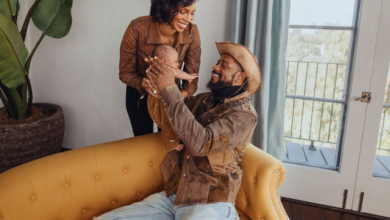Tina Turner’s Daughter-in-Law Afida Planning for Baby with Late Husband Ronnie’s Sperm (Exclusive)
In an exclusive interview, the French singer and actress opens up about grasping onto hope after the heartbreaking deaths of Ronnie and Tina Turner
:max_bytes(150000):strip_icc():focal(739x120:741x122):format(webp)/afida-turner-mag-rollout-4-tout-072523-4542f1ca266f4e6697a56c050d6b9f4c.jpg)
Every day, French-born singer and actress Afida Turner feels a deep well of grief. “My heart is destroyed,” the 46-year-old says, fighting back tears over a Zoom call from Egypt, where she traveled to process her mental anguish for the past month while searching for her happiness again.
Seven months ago Afida’s husband Ronnie Turner, the only biological son Ike and Tina Turner shared, suddenly succumbed to colon cancer at 62. Then in May her mother-in-law — the Queen of Rock and Roll — also died, aged 83, after years of battling health issues. (She had a stroke in recent years and was known to be struggling with a kidney disease and other illnesses.)
The one-two-punch of their deaths has been excruciating for Afida, who had built a “beautiful” life in Encino with Ronnie over the past 15 years. “It’s a punishment. Morning and night, I’m crying and screaming,” she says, her throaty voice softening to a whisper. “My life in Los Angeles became a nightmare — a real nightmare. That’s why I got the f— out of there. No house, no furniture. Just my memories and Ronnie’s clothes.”
:max_bytes(150000):strip_icc():focal(449x0:451x2):format(webp)/afida-turner-mag-rollout-2-072523-545da5abeb3740e7904fe9ef50702285.jpg)
At night, she feels a darkness so devastating she can barely brave the weight of.
“It was very sad that Ronnie passed, and then his mom passed six months after. It is very difficult for me because people only see the music or the pictures, but I go back home and scream the names of my loved ones. [That pain] will never go away,” she says. “I’m still very depressed and thinking about very bad, dark, bad stuff,” Afida admits wistfully. “You don’t want to go through this in life. You have to talk to God, otherwise you go nuts and kill yourself. I’m suffering and my heart is destroyed. I’m trying not to lose my mind.”
Today, the only thing keeping Afida going, she says, is the thought of motherhood. “I’m going to have Ronnie’s baby!” she exclaims, rapidly folding her hands, her two-inch coral lacquered nails clicking in elation. In the coming year, she hopes to honor her late husband by expanding their family with her eggs and the sperm he froze as a birthday gift to her before his death last year. “If I can,” she adds, “I’m 46. But we’ll see.”
Before he died, Ronnie — who was three years sober — worked out at the gym, ate nutritious meals, practiced Buddhism like his mother Tina and went to monthly checkups for his health.
He was seemingly ready for fatherhood last November — until doctors spotted a tumor and diagnosed him with late-stage metastatic colon cancer, which quickly spread to the pancreas and stomach.
The following month, Ronnie stopped breathing and collapsed outside on the sidewalk of their Encino home when Afida was out of town for work.
She had FaceTimed with him just the night before — the last time she ever heard from her husband again. Ronnie was scheduled for chemotherapy on December 15, she recalls, but he died exactly one week earlier.
She hopes to carry the baby through IVF before her next birthday on Dec. 22. “It’s still bad because he’s not here, but what can I do?” she asks. “At least I will have a little one that looks like Ronnie. A monster like me and him, can you imagine?”
After finding fame in her home country on the French version of Big Brother in 2002, Afida pursued her passion for singing and released her debut album Roc Attitude in 2003. Her career eventually brought her to Los Angeles, where she met Ronnie in 2005 during a fateful recording session. She was working on her soul-pop song “French Kiss” (released on Paris Hollywood in 2011) with engineer Ike Turner Jr., who invited his brother Ronnie to play bass and guitar on the track.
“Wow, he looks good. . . . I like that,” Afida recalls thinking of Ronnie, who gave her a “magic kiss” in the studio. She gazed at his tall physique, broad shoulders and long face when he took his shirt off. When he pulled her close, she felt immediate chemistry.
A year later, after a weeklong writing session at his Hollywood home, Ronnie wanted to be exclusive. “Please stay with me,” he said to Afida, she remembers. “Don’t go. I’m depressed.”
Despite their undeniable connection, Afida — who previously dated the late rapper Coolio and boxer Mike Tyson — was wary. “We connected, but his lifestyle was too crazy for me,” she says of Ronnie, who had faced several drug-related arrests and was charged with cocaine possession in 1999. “I will not be with you if you’re still doing all that kind of rock and roll lifestyle, smoking and stuff like that,” she told him. “So I said, ‘No, we’re just going to be friends.'”
But Ronnie was persistent, and presented Afida with an engagement ring on her birthday a few months into their relationship. “I said, ‘Are you crazy? It’s too early — but I’ll take the ring!'”
By March 2007, three months later, they were married. “We didn’t have no f—ing money. We had a very small wedding,” she recalls of their intimate Hollywood ceremony. (Tina publicly stated she had cut her children off financially by 1986.)
Their bond wasn’t just physical. Afida knew that Ronnie loved her more than anybody else. “My Black baby,” she called him. Her devotion stemmed from mutual traumatic upbringings that unified them.
:max_bytes(150000):strip_icc():focal(749x0:751x2):format(webp)/afida-turner-mag-rollout-1-072523-ad6caba0bb284d24b3b571839ccc3b0c.jpg)
Afida became an orphan at age 2 when her father beat her mother to death, she says, leaving her in a foster system until she turned 16. “I had a very, very, very hard life. I wish I had known them,” she says of her parents, “but I tried to make my life better.”
Like Afida, Ronnie was born into an abusive household. During their stormy marriage, Ike would beat Tina, and Ronnie and his siblings saw and heard their endless fighting. “I knew it would make an impression on them, and it did,” Tina — who left Ike in 1976 before finalizing the divorce two years later — wrote in her 2018 memoir My Love Story: Tina Turner.
Though Tina’s life story has been told many times, she was never able to escape the constant stories about her difficult past. PEOPLE’s 1981 bombshell interview exposed Ike’s cruelty, and her autobiography-turned-movie, and the HBO documentary Tina, further detailed Tina’s abusive marriage with Ike.
But Ronnie found stability in Afida, and the newlyweds celebrated again with family at Tina’s home in the South of France in July. The bride wore a gown borrowed from her mother-in-law, who warned her that Ronnie could be like his father.
“I am a very straight-up person, and Ike and Tina liked that, because they were the same kind of people. Ronnie too,” says Afida, who adds that her husband was never abusive. “When I screamed, he broke plates,” she admits, her voice thick with emotion. “But he was kind. He loved the drama, and was like the same blood. I belonged to that family.”
Throughout their marriage, Afida was a rock for Ronnie, who struggled with depression and suicidal thoughts. In their early days together, she urged him to seek treatment for his addictions. When Ronnie’s father Ike died of a cocaine overdose in 2007 at age 76 (after not being invited to their nuptials), Ronnie lost all control.
“I had never seen Ronnie cry like that. I was helping him,” says Afida, who tried her best to lift her husband’s spirits. “He was very broken. His soul was almost destroyed. I tried my best to give him everything I could. I think he loved the fact that I was very motherly to him.”
But the grief continued throughout the years. Five years ago — over a decade into their marriage — Afida and Ronnie were the ones who found his older half-brother Craig (Tina’s firstborn with saxophonist Raymond Hill) after he died by suicide at age 59.
“Oh, my God!” Afida remembers she screamed before falling to her knees in disbelief. Also in shock, Ronnie couldn’t bear the endless family trauma, she says.
:max_bytes(150000):strip_icc():focal(599x0:601x2):format(webp)/afida-turner-mag-rollout-3-072523-753902b059394288a8a37a6768373f30.jpg)
“I made sure he didn’t kill himself,” says Afida. “Ronnie was a lonely, destroyed man without love. I saved his life. We were both kind of like orphans: broken souls, broken hearts and I was doing everything for him.”
Afida remained Ronnie’s anchor until the very end. While flicking her curly blonde locks, she moves in closer, flashing the diamond wedding ring she still wears. “You have to really make sure you appreciate loved ones because you never know when’s the last time you see them,” she says. “It’s such punishment and very, very hard. No matter what you do, how much you buy — it doesn’t take the pain away.”
As Afida adjusts to life without her family, she’s found solace in traveling and her music, and yearns to become a mother.
“Ronnie left me a very nice gift,” she says, exhaling, relieved to finally share her big secret. That baby, she says, would be the ultimate posthumous gift from her beloved husband.
“He was a big character with big energy and craziness who was perfect,” says Afida, grinning. “I won’t ever find another man like that in my life.”




